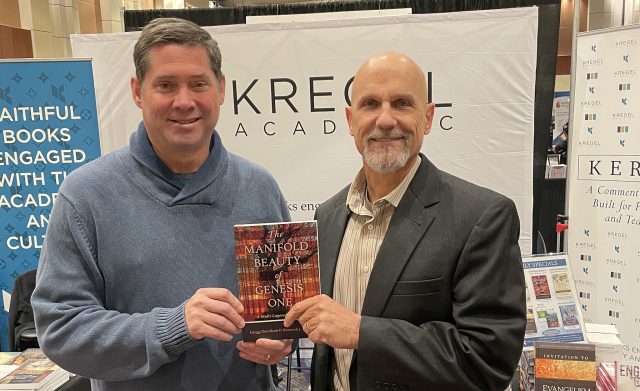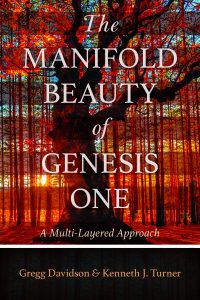
Gregg Davidson (right), UM chair and professor of geology and geological engineering, and Kenneth Turner, professor of Old Testament and biblical languages at Toccoa Falls College, display a copy of ‘The Manifold Beauty of Genesis One: A Multi-Layered Approach’ at the recent meeting of the Evangelical Theological Society in Fort Worth, Texas. The book was featured at the conference of the largest society of evangelical scholars, theologians and pastors in North America. Submitted photo
OXFORD, Miss. – What happens when a geologist at a state university and a theologian from a private Christian college jointly examine the biblical creation story? The answer is a new book that is appealing to people in both the academic and religious communities.
Gregg Davidson, chair and professor of geology and geological engineering at the University of Mississippi, has co-authored “The Manifold Beauty of Genesis One: A Multi-Layered Approach” (Kregel Academic, 2021) with Kenneth J. Turner, professor of Old Testament and biblical languages at Toccoa Falls College in Georgia.
Passionate about dispelling common misconceptions of inherent conflict between the Bible, science and archaeology, the authors hope the volume will build trust and dialogue between the religious and scientific communities.
“Being a scientist and a person of faith makes me a natural liaison between the two groups and opens a door which otherwise might stay shut,” Davidson said.
He notes that while his previous publications tackled apparent conflicts between the Bible and science, the new work focuses on the richness of the biblical text in its original context.
“When you consider the audience and culture of Israel and its neighbors at the time of writing, you discover there is much more to the message than a journalistic sequence of events,” he said. “Our book walks readers through seven complementary layers of theological story. None are in conflict with science or archaeology or the inspiration of scripture.
“Our hope is that the book will diminish the perceived gap between faith and science.”
An alumnus of Wheaton College and the University of Arizona, Davidson joined the Ole Miss faculty as an assistant professor in 1996.
His primary scientific interests and expertise are in groundwater and surface water interaction, isotope geochemistry, wetland hydrology and ecohydrology. His books and scientific papers have led to speaking engagements across the nation and to countries on six continents.
In the Beginning
Davidson met Turner at a 2013 meeting of those who had received small grants from the BioLogos Foundation and Templeton Foundation for projects addressing perceived conflicts between science and Christian faith. Turner, who was at Bryan College at the time, had teamed up with a biologist colleague to create home-schooling materials.
“We developed a professional and personal friendship that persisted over the years,” Davidson said. “I liked his writing style and I appreciated his efforts to bring clarity to contentious or confusing subjects.”
Turner said he has always had a passion for science, leading to an undergraduate degree in mathematics and physics education. His graduate studies may have taken him on a different path, but his love of nature has remained.
“Working alongside a practicing scientist was invigorating, allowing me to converse in greater depth on things I don’t normally get to do in my daily life,” Turner said. “Writing together was a great reminder that we are all gifted in different ways, and we’re better off combining our strengths, challenging each other’s perspectives and cooperating for the greater good.”
Davidson had a vision for the mission and general structure of the book, but he also knew he lacked the formal theological training and credentials needed to bring a book like this to life. Turner has expertise in Hebrew and Old Testament theology.
The duo was inspired to write the book as they considered how discussions of Genesis 1 commonly view it as a monochromatic text that must be understood from a single perspective.
“The thesis of ‘Manifold Beauty’ is that the story is vastly richer than we give it credit, with multiple complementary layers of truth found as we dig,” Davidson said.
“‘Manifold Beauty’ is not a typical ‘Four Views of X,’ where each view is presented in competition with the others. Rather, it is an argument for multiple layers of understanding – up to seven – that could all be simultaneously true.”
New Layers on the Old Story
Layers through which Davidson and Turner explore the Genesis 1 story include polemic, song, covenant, analogy, calendar, promised land and temple. Each chapter shines a spotlight on the book as theologically rich literature first and foremost, exploring the layers of meaning that showcase various aspects of God’s character.
“We draw an analogy to the mineral fluorite,” Davidson said. “Under normal light, fluorite may appear pink in color, but beneath ultraviolet light, a specimen may glow blue.
“The substance itself is not changed. The different lighting simply brings out another layer of its character.
 “The Manifold Beauty of Genesis One” is Davidson’s third book. Other titles he has written and/or edited are “Friend of Science. Friend of Faith: Listening to God in His Works and Word” (Kregel Academic, 2019) and “The Grand Canyon: Monument to An Ancient Earth” (Kregel Academic, 2015).
“The Manifold Beauty of Genesis One” is Davidson’s third book. Other titles he has written and/or edited are “Friend of Science. Friend of Faith: Listening to God in His Works and Word” (Kregel Academic, 2019) and “The Grand Canyon: Monument to An Ancient Earth” (Kregel Academic, 2015).
Critical reviews have acclaimed Davidson’s previous books as “a greatly needed resource for the church today,” “direct and insightful” and “a treasure chest of information about the world of the Bible and the world that the Bible describes.”
Davidson’s scholarship, leadership and innovation has received praises from peers, including Joel Duff, a biology professor at the University of Akron.
An excerpt from a book review on his blog site reads, “I have read countless commentaries, popular books and scholarly papers on the subject. Each adds some new perspective, some new insight, but I often feel let down as if there is something that is missing. … I have been waiting for a book that I can give to another Christian who is earnestly grappling with understanding the Genesis text. … My long wait has come to an end with the publication of ‘The Manifold Beauty of Genesis One.'”
And It Is All Good
Davidson and Turner recently attended the Evangelical Theological Society’s annual meeting in Fort Worth, Texas, where they made a presentation and signed copies of their book for buyers.
Beyond simply shining light on the beauty of the biblical text, the authors hope is that the book will move the church toward greater unity, reducing the division that comes from defending one interpretation over all others.
“With this, our hope is that we can lay down our swords that are so often drawn in an unnecessary science-versus-faith mentality,” Turner said. “We want people to love God’s word and God’s world.
“Likewise, we hope Christians will learn to study the Bible together – with open hands, open hearts and open minds.”
Davidson agreed.
“We look forward to hearing Christians shift to discussions of their favorite interpretations of Genesis 1 rather than bickering over which interpretation should kick all the others out of the theological nest,” he said.
For more information on Davidson’s work, visit https://greggdavidson.net/.
